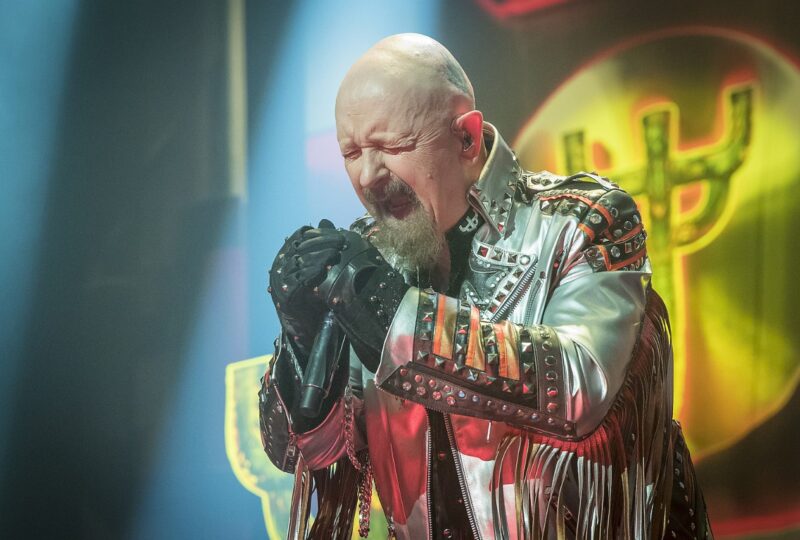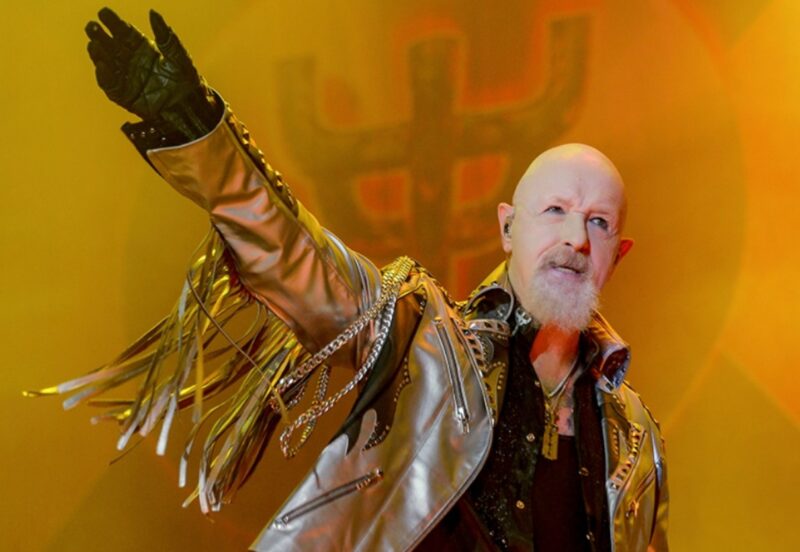Judas Priest is a British heavy metal band formed in Birmingham, England in 1969. They have sold over 45 million albums worldwide. The band’s first four studio albums – Rocka Rolla (1970), Sad Wings of Destiny (1976), Hell Bent for Leather (1978) and Sin After Sin (1977) – are regarded as among the pioneering works of heavy metal music.
The judas priest albums ranked is a blog post that discusses the top 10 Judas Priest albums.
Former Judas Priest guitarist K. K. Downing, who currently fronts the band K.K.’s Priest, recently said that the current J.P. lineup is undeniably skilled. He regretted, though, that the interaction and solo exchanges that he and Glenn Tipton used to have were no longer there. When Tipton, who is fighting Parkinson’s Disease, was forced to leave the stage a few tours ago, producer Andy Sneap stepped in to cover the Live guitar responsibilities. And concentrate almost entirely on writing the band’s intricate music, it’s true that Ritchie Faulkner (who succeeded Downing) took the majority of the more difficult leads.
In 2024, however, this is no longer the case! Sneap has proven that while the rest of the world was trying to outwit COVID-19, he was busy mastering some of the most memorable solos in music history, and they were on full and flawless display as Judas Priest roared into Youngstown, Ohio to celebrate over fifty years of “Judas Priest style heavy metal.”
Downing, who is as brilliant, may not have realized it, but he made a blunder.
Metalology has spanned more than 50 years
Ritchie Faulkner, who joined Judas Priest in 2011, confessed to Audio Ink Nation that he “cried a tear” thinking about what the band has achieved while discussing about the band’s 50th anniversary on September 15 (due to COVID lockdown, longer: 1969).
Similarly, even though his beard has earned him the moniker “the Gandalf of heavy metal,” vocalist Rob Halford told 105.7 The Hawk that his beard has made him “the Gandalf of heavy metal.” He added, “Reflecting,”
Exactly. You’re thinking about that program late at night, and here we are in the year 2024, on this exact day, this week, this month. Although 1971 is unconsciously at the back of your mind, you don’t think about it.
You’re presenting yourself with an experience that you can construct, and you’re trying to define everything in the time you have.”
“Ultimately, it’s been incredibly pleasant to perform a profession that I love,” said founding member and bassist Ian Hill, who was only 17 years old when he began it all. Some portions were more enjoyable than others, but from the beginning, when I slept in the van in the frigid cold, until the present, I count my blessings every day.
It’s been a joy to do it with individuals I consider friends rather than coworkers.”
You only have one chance at greatness

Judas Priest is one of the few bands that has more than one “classic” album. Some aficionados believe that British Steel, when performed in its full to commemorate the band’s 30th anniversary, is THE Judas Priest album, while others argue that Painkiller is much more timeless. This time, Priest was not holding anything back. “One Shot At Glory,” the only song performed from 2018’s hugely popular “Firepower” album, began the performance, followed by the violent assault of “Lightning Strikes,” the sole song played from that record.
From then, it was prodigy-level musicianship, amazing vocal convictions, drumming brilliance, and a light display that would make Pink Floyd feel like they were missing out on all the fun.
This performance, like so many others from Judas Priest, was noteworthy because of the little adjustments and surprises. They don’t depend on the same few songs and smashes to keep fans coming back, unlike many other bands with lasting power.
Quite the contrary,
When a regular classic like “Metal Gods” does not make the cut – as it did this time – most fans are overjoyed by the variety.
Such enthusiasts are also interested in seeing what little adjustments will be made to the catalog’s arrangements. For example, on “Turbo Lover,” the electronics are back, which hasn’t been the case in a long time.
While the guitars continue to perform many of the keyboard sections, Judas Priest clearly intended to remind the world who contributed to the advancement of industrial music, and this addition accomplished exactly that.
As bassist Ian Hill chopped steadily on stage left, Scott Travis added nuance with every foot roll and accent on the drums, and Andy Sneap stepped up in ways no one expected, Faulkner, perhaps one of the best guitarists alive today, handled the solo duties as if they were his own creations (newer music is his creations).
During his rapid-fire rendition of “Freewheel Burning,” the complicated solo-heavy monster from Judas Priest’s classic “Defenders Of The Faith” L.P., Sneap, who is also an excellent producer, gave everyone a taste of his real ability.
The audience realized that J.P. had two full-fledged lead guitar players once again by the time Sneap had all but sheared the strings from the instrument!
Another feature that has contributed to the strength of “Judas Priest style heavy metal” is that both guitarists will often play the same section or harmonic portions at the same time, especially during guitar solos. As heard as the band erupted into Painkiller’s “Hell Patrol” this calling card of the metal greats is back on display.
Rob Halford’s awe-inspiring, timeless voice was to once again earn the title of genuine metal god throughout this song. It’s difficult to determine if it’s 2024, 1984, or 1990 – the year the Painkiller fought to rescue heavy metal if one closes their eyes.
The last stanza of “Hell Patrol” displayed a range of vocal ability that has never been equaled by anybody else in history.
A smidgeon of evil

The hauntingly heavy “Touch Of Evil,” from the Painkiller classic (which had been requested by fans), was a special highlight in that song, too, had its keyboard sections restored. It was wonderful to hear, as it was a combination of the guitars playing the cryptically haunting keyboard lines with the real sounds themselves, similar to “Turbo.”
Similarly, “Victim Of Changes” has returned to the repertoire, a song that has a little bit of everything and necessitates that the vocalist singing it be in peak form at all times, a job that Halford easily accomplished. The song’s sheer strength and ferocity, along with the song’s intimidating octave hopping, gripped those in attendance, but it was the return of Sneap, who joined the prolific Faulkner, that brought the song to aural perfection.
Playing at the same time in perfect cadence elevated their delivery to legendary heights of excellence, similar to “The Sentinal,” which features even more vocal leaps and quicker solos. Even “Hell Patrol” and the magnificent “Victim Of Changes” were despised in this respect by “The Sentinal,” albeit Faulkner’s adaptation of K.K.’s solos on the latter cannot be emphasized.
Little things matter to Judas Priest, too, and they didn’t hesitate to point them out to anybody who would listen. For example, Priest returned to 1981’s “Point Of Entry,” a tepid follow-up to “British Steel” but, because to the song “Desert Plains,” has become a much-loved “must-have” CD today. The key change that came in towards the conclusion of the song was delivered with such a feeling of lift that it elevated the whole tune.
It was energizing and refreshing.
If there was any space for criticism, it occurred during Judas Priest’s performance of “Blood Red Skies,” a track from the criminally underappreciated “Ram It Down” CD. While the inclusion of this song was definitely appreciated, and the band’s performance was excellent, Rob Halford’s entrance was left in one octave instead of the strong beginning that was in the studio version of the song for unexplained reasons. Given that the metal master could reach considerably higher notes during songs like “Painkiller” and “Victim Of Changes,” the change in arrangement appeared to detract a little from the tune.
However, if anybody was concerned about Halford’s vocal capabilities at 70, it was that song, “Painkiller,” that demonstrated that such fears were unfounded.
While the last note was not as long as some of the other scorching notes during the evening, it was a flawless song. “Painkiller” would be Judas Priest’s “Master Of Puppets,” and they absolutely destroyed any uncertainty in its delivery.
To the pleasure of diehards, the VERY obscure “Invader” was performed, a song that cautions aliens not to meddle with the human species. “Invader” performed exactly what “Saints In Hell” did on the previous tour. True fans were given a once-in-a-lifetime opportunity.
The last songs, “Breaking The Law,” “Living After Midnight,” and “Hellbent For Leather,” were performed, with Halford riding his Harley into the stage, as he has done many times before.
The bike has been on previous tours for different songs, but this time it was “Hellbent…” that brought the tradition back.
One strange element that didn’t seem to match was when the band inflated a huge bull with red flashing eyes at the conclusion of the performance; it was nearly a third the size of the stage, but because they didn’t play “Metal Gods,” it looked weird and out of place.
Then the night came to an end. “You’ve Got Another Thing Comin’” was performed at the opening of the performance, a risky decision given that it was their greatest hit. This was a brilliant concept, since it left the audience guessing as to how the performance would finish, but Halford did not fail to shout “Whoa O Whoa” to the crowd before leaving, as is customary.
As they walked away, it was clear which band was still the best metal band on the planet, and, best of all, the banner that all Judas Preist fans look forward to seeing on the big screen above the stage set adorned with smoking barrels and medial warnings – the banner that all Judas Preist fans look forward to seeing.
“JUDAS PRIEST WILL BE BACK,” it vowed once again. Fans need not worry that they have seen the metal gods for the final time as long as that message is broadcast and they finish on that note, as is customary.
Judas Priest is a heavy metal band that was created in the year 1968. They have been around for over 50 years and are still going strong. Reference: is judas priest touring in 2024.
Frequently Asked Questions
Is Judas Priest considered heavy metal?
Yes, they are considered an early heavy metal band.
When did Judas Priest become popular?
In the 1970s, Judas Priest became one of the most popular heavy metal bands in the world.


